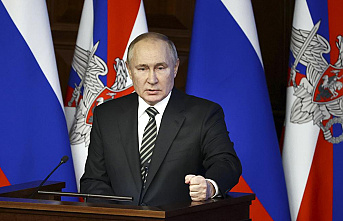The women were actually trying to help the Moroccans avoid border patrols and not keep them in detention. They handed out hand-warmers to the migrants who were shivering, then helped them hide in the snowy woods until they could reach the coast. Then, they steered them to waiting cars which whisked them from their frozen peaks to warm shelters.
Hamid Saous, one of the rescuers, said that they treated us as humans. "Not everyone does this."
Europe is erecting ever more intimidating barriers against migration. Volunteers working along the Italy-France frontier to prevent migrants being killed or maimed in cold and mountain mishaps are motivated by a simple belief: People are exiles from conflict zones, oppression, and all sorts who trek through Europe's Alps to seek better futures.
The Alpine helpers, who are equipped with hot tea and believe that their humanity will be diminished if they leave pregnant women, children, and men of all ages to care for themselves, counter populist politicians in Europe, who claim that migrants, especially Africans and Muslims, threaten European lives and liberal traditions.
The approach to the Alps is essentially humanitarian and humanist. It is rooted in local traditions that do not leave people exposed against the elements. Mountain workers were quick to refuse to turn their backs when they encountered thinly dressed migrants on Alpine passes in 2016.
This assistance led to hundreds of volunteers establishing networks that provide shelters for migrants, clothing those who are unable to cross dangerously and trekking into the cold. They make snow paths for migrants each day and wait for them at nights to guide them past border officers to safety.
"Often, we say, 'Welcome! "How are you?" We speak English because most people speak English," Paquerette Forest, a volunteer teacher and helper, said.
She said that while some people refuse to accept assistance, most are "men who seem quite strong". "Exhausted people say, 'Yes.'"
"We walk discreetly with them. We do our best to avoid being noticed. If necessary, we wait in the forest. We sort out the vehicles and then we pick them up," she explained.
Volunteers are credited with saving the lives and limbs of migrants. The Alps don't pose as much danger to migrants as the Mediterranean Sea. This year, hundreds of migrants have disappeared or died in the Mediterranean Sea. The tragedy of the sinking boat that claimed 27 lives, mostly Iraqi Kurds, was not as devastating for the mountains, which occurred in November on the English Channel.
Aymen Jarnane (23), another Moroccan leader, said, "If it wasn't for them, we wouldn't have died from cold." This was on a night when temperatures dropped to minus-15 Celsius (5 Fahrenheit).
There have been many deaths. After a Togolese man became hypothermic due to freezing temperatures, aid groups appealed to French authorities to stop forcing them back into Italy. This happened in February 2019.
Bizhan Bamedi, an Iranian exile, had a companion film him crossing the border to show how difficult it was.
"Hi guys. "Hi guys, I'm recording this to those who might say, "Good for you, you went all the way to Europe!" he exclaimed, as he was ankle deep in snow and surrounded by frosted pines. "Someone like myself, who has crossed mountains and jungles from Turkey to get here is now. I don't have a place to lie or sit. It's a very difficult road.
He continued, "The temperature is minus-10 degree." "I am hungry and thirsty, but I can't eat snow. Good luck!
The border crossing is not only difficult physically, but also cruel in that many Europeans cross it without knowing it exists. The border is crossed by ski runs and is a paradise for tourists who don't want to be stopped by police. It is so hostile for migrants that many give up quickly, even if they have donated cold-weather gear.
Jarnane stated, "When you are African with black hair, you won't get through no matter how much you dress." People can see that you have brown eyes, even if you wear a hat.
In the fortified town Briancon, health workers from the French side of the refugee camp for migrants patch up the lucky ones.
After caring for an Iranian patient with an infected foot, Isabelle Lorre of Doctors of the World said, "People arrive cold and dehydrated, thirsty or hungry." She said that she had treated him for 15 hours, while he trekked through snow that he claimed was up to his thighs.
European opponents to migration claim that exiles are encouraged to follow their example. Those who are helping them in the Alps believe that it is impossible to stop helping.
Jean Gaboriau (a mountain guide who runs the Briancon shelter) said that some of them have travelled 7,000 to 8,000 km before arriving here.
"Regardless of skin colour, political or religious belief, everyone has the right be saved or welcomed.












